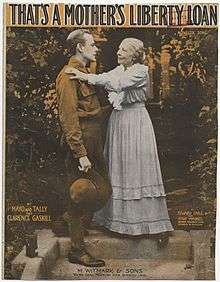Clarence Gaskill
| Clarence Gaskill | |
|---|---|
| Born |
February 2, 1892 Philadelphia, Pennsylvania |
| Died |
April 29, 1947 (aged 55) Fort Hill, New York |
| Nationality | American |
| Occupation | Lyricist and Composer |
| Years active | 1920s to early 1930s |
| Known for | I Can't Believe That You're in Love with Me, Prisoner of Love, and That's a Mother's Liberty Loan |
Clarence Gaskill (February 2, 1892 – April 29, 1947) was an American composer and lyricist active during the 1920s to early 1930s. His most well-known songs include, Doo-Wacka-Doo (1921). I Can't Believe That You're in Love with Me (1927), and Prisoner of Love (1932). His first hit came in 1919 with I Love You Just the Same, Sweet Adeline.
Personal life
Gaskill was born on February 2, 1892 in Philadelphia, Pennsylvania.[1] He attended St. John's School and Friends School in Pennsylvania. Gaskill's first music teacher was his mother, but he was later taught by private teachers.[2]
Gaskill died on April 29, 1947 in Fort Hill, New York.[1]
Career
At the age of 16, Gaskill was employed at a local theatre, working as a pianist. By the age of 21, he had founded his own music publishing firm.[2]

During World War I, he served as a machine gunner. For his service, he earned the Purple Heart.[2] Gaskill also entertained troops during the war, and even wrote the war song, That's a Mother's Liberty Loan.[3]
After the war was over, Gaskill toured vaudeville under the stage name, "Melody Monarch."[2]
His first hit was in 1919, with the release of I Love you Just the Same, Sweet Adeline. Two years later he joined the American Society of Composers, Authors and Publishers.[2] Gaskill wrote the song, Prisoner of Love in 1932. It was re-recorded by various artists including, The Ink Spots, Billy Eckstine, and Perry Como.[1] His song, Doo-Wacka-Doo (1921), capitalized on the "Hawaiian craze" popular during that time. The song was made famous by Paul Whiteman's orchestra.[3]
Gaskill was employed by Irving and Jack Mills.[1] He wrote music for Earl Carroll's Vanities (1925) and Keep it Clean (1929).[3] Throughout his career he collaborated with various musicians, lyricists, and composers, including Jimmy McHugh, Irving Mills, Duke Ellington, Leo Robin, and Cab Calloway.[2]
Because he was very knowledgeable about the music business and copyright laws, Gaskill was able to use that to his advantage. He claimed composer credit on Christmas songs and nursery rhymes like, Jingle Bells, Adeste Fideles, The Farmer in the Dell, and Twinkle, Twinkle, Little Star.[3]
Selected works
- Another Perfect Day Has Passed Away. With Robert H. Noeltner, Haia Kaa, and Ethel Shutta. 1933. Keit-Engel. OCLC 22534868[4]
- Prisoner of Love. With Leo Robin and Russ Columbo. 1931. Mayfair Music Corp. OCLC 18861310[1][5]
- Minnie the Moocher. With Cab Calloway and Irving Mills. 1931.[1][6]
- I Can't Believe That You're in Love with Me. With Jimmy McHugh. 1927. Jack Mills Inc. OCLC 18894785[1][7][8]
- Nobody's Business Fox Trot. With Irving Mills. 1926(?). OCLC 6740250[9]
- Doo-Wacka-Doo. With Will Donaldson and George Horther. 1921. Capitol Records. OCLC 681752914[1][8][10]
- I Love You Just the Same, Sweet Adeline. With Harry Armstrong. 1919. Edison Blue Amberol. OCLC 40071660.[11]
References
- 1 2 3 4 5 6 7 8 Jasen, David A. (2003). Tin Pan Alley: An Encyclopedia of the Golden Age of American Song. New York: Routledge. p. 146. ISBN 0-415-93877-5.
- 1 2 3 4 5 6 "Clarence Gaskill". Pianola. Pianola. Retrieved 21 January 2016.
- 1 2 3 4 Burlingame, Sandra. "Clarence Gaskill". Jazz Biographies. Jazz Biographies. Retrieved 21 January 2016.
- ↑ "Another perfect day has passed away". OCLC WorldCat. OCLC WorldCat. Retrieved 21 January 2016.
- ↑ "Prisoner of love". OCLC WorldCat. OCLC WorldCat. Retrieved 21 January 2016.
- ↑ Furia, Philip (1990). The Poets of Tin Pan Alley. New York: Oxford University Press. p. 258. ISBN 0-19-506408-9.
- ↑ "I can't believe that you're in love with me". OCLC WorldCat. OCLC WorldCat. Retrieved 21 January 2016.
- 1 2 Jasen, David A. (1988). Tin Pan Alley: The Composers, the Songs, the Performers and their Times. United States: David I. Fine, Inc. pp. 151, 187. ISBN 1-55611-099-5.
- ↑ "Nobody's business fox trot". OCLC WorldCat. OCLC WorldCat. Retrieved 21 January 2016.
- ↑ "Doo wacka doo". OCLC WorldCat. OCLC WorldCat. Retrieved 21 January 2016.
- ↑ "I love you just the same sweet Adeline". OCLC WorldCat. OCLC WorldCat. Retrieved 21 January 2016.